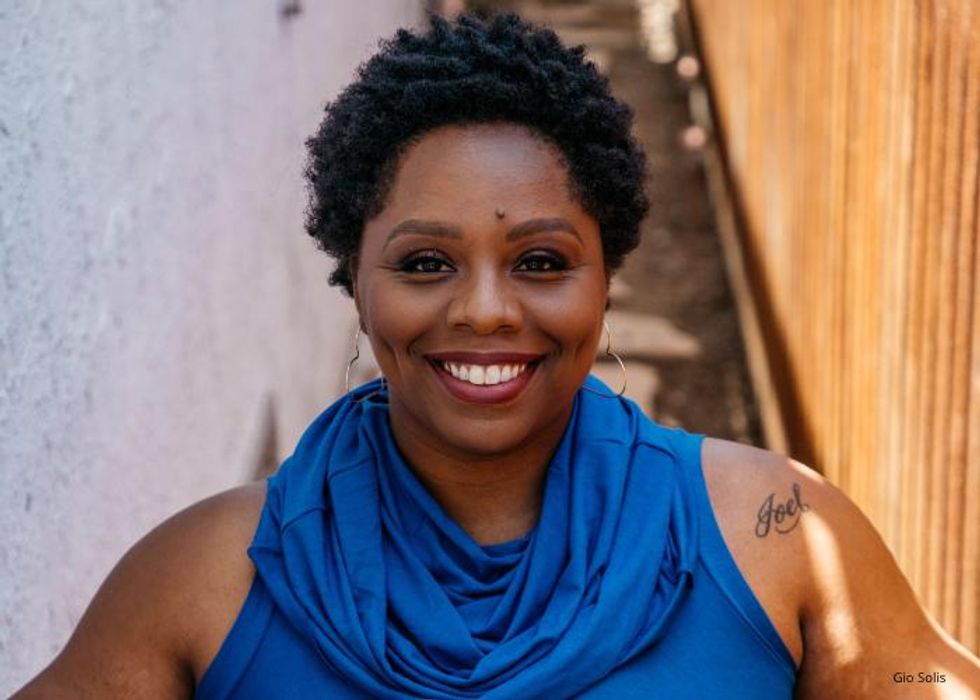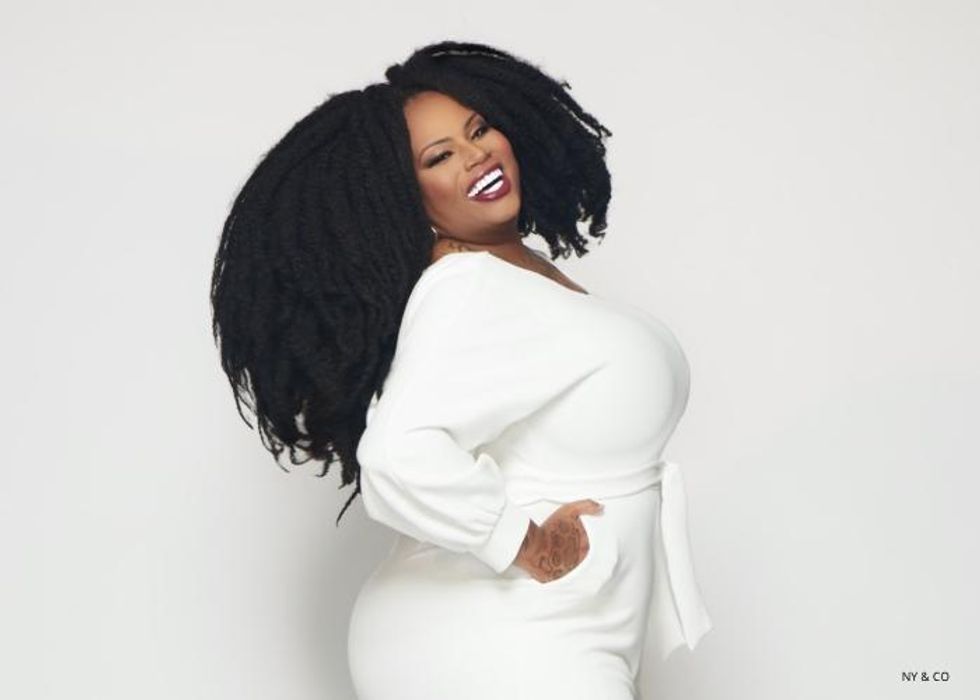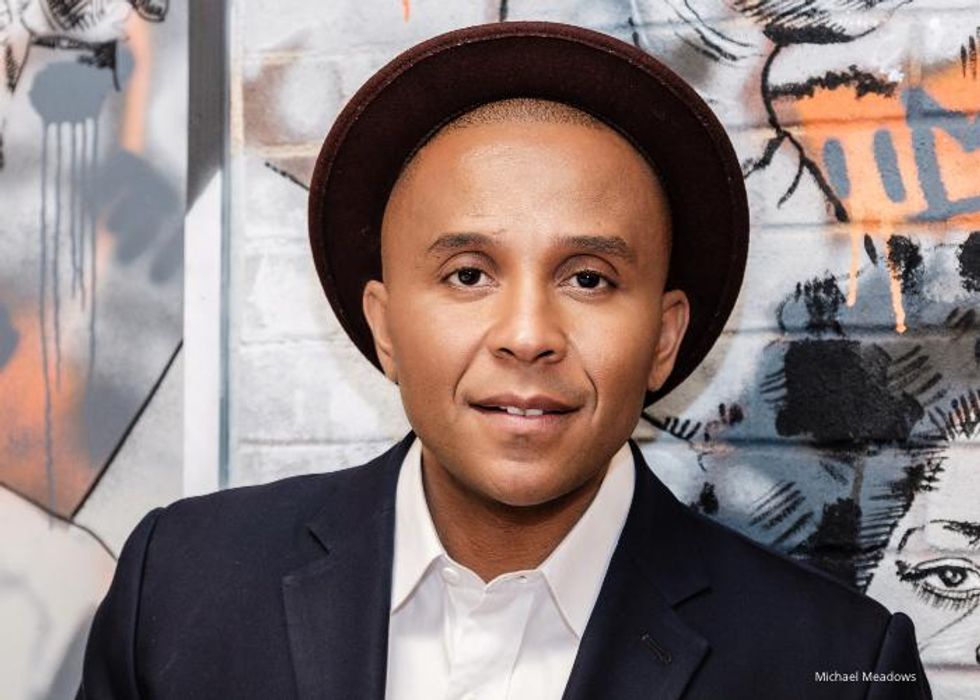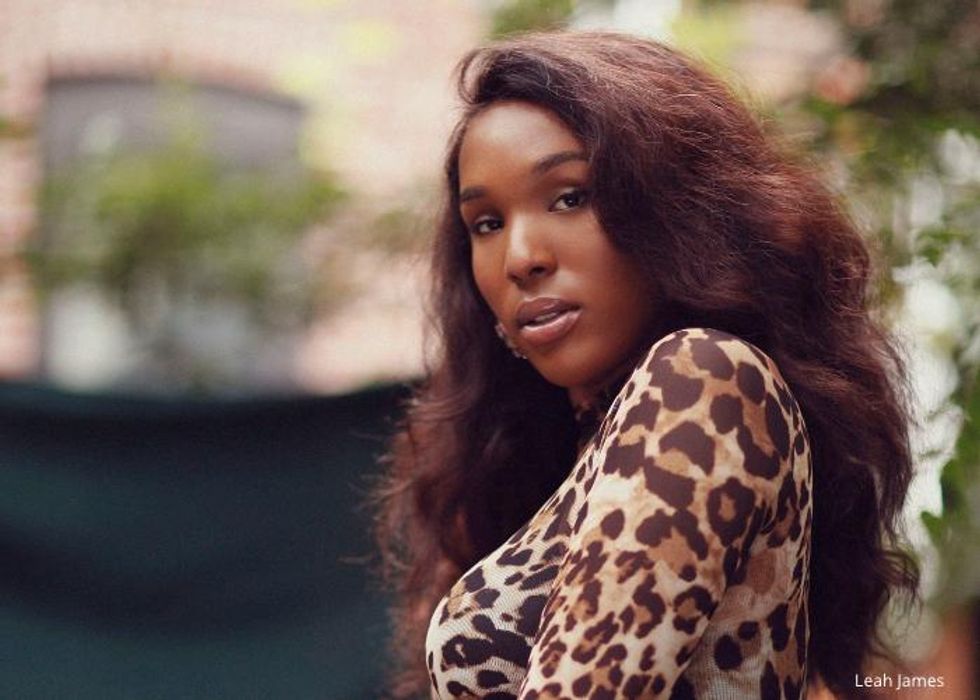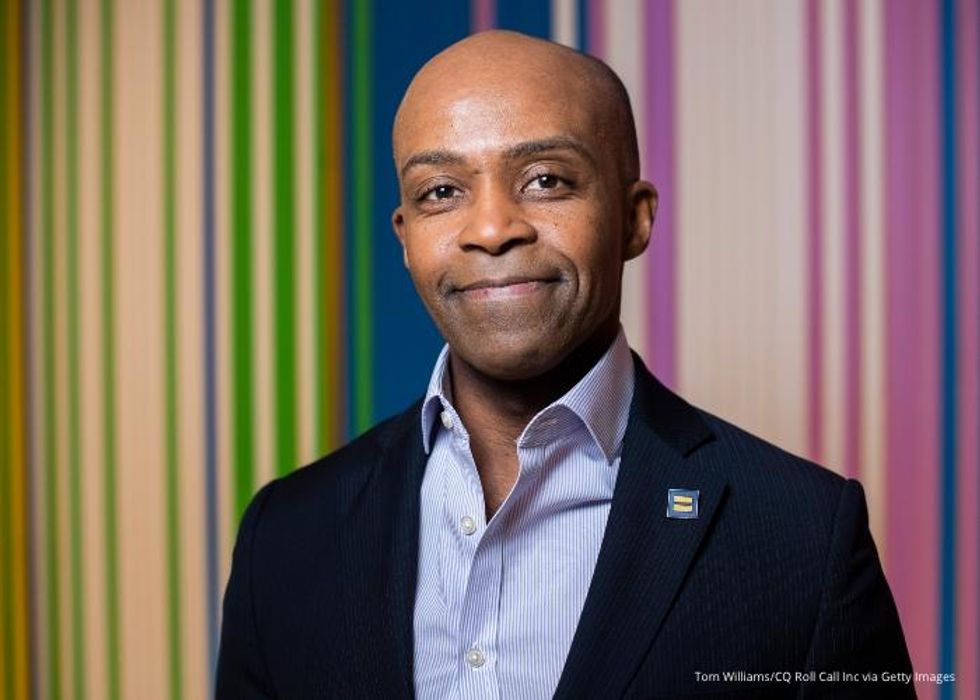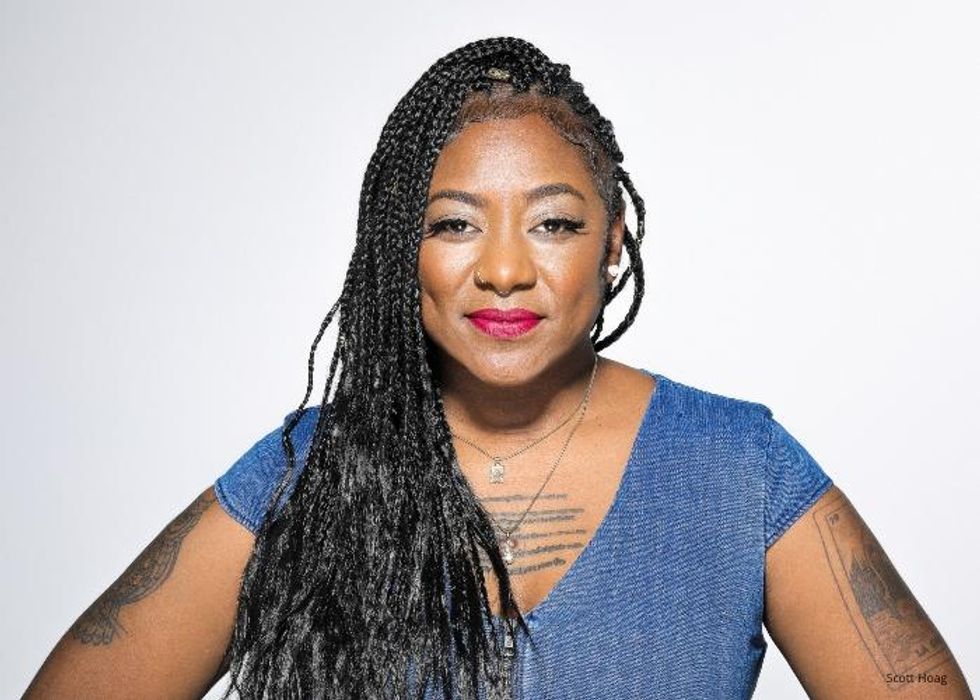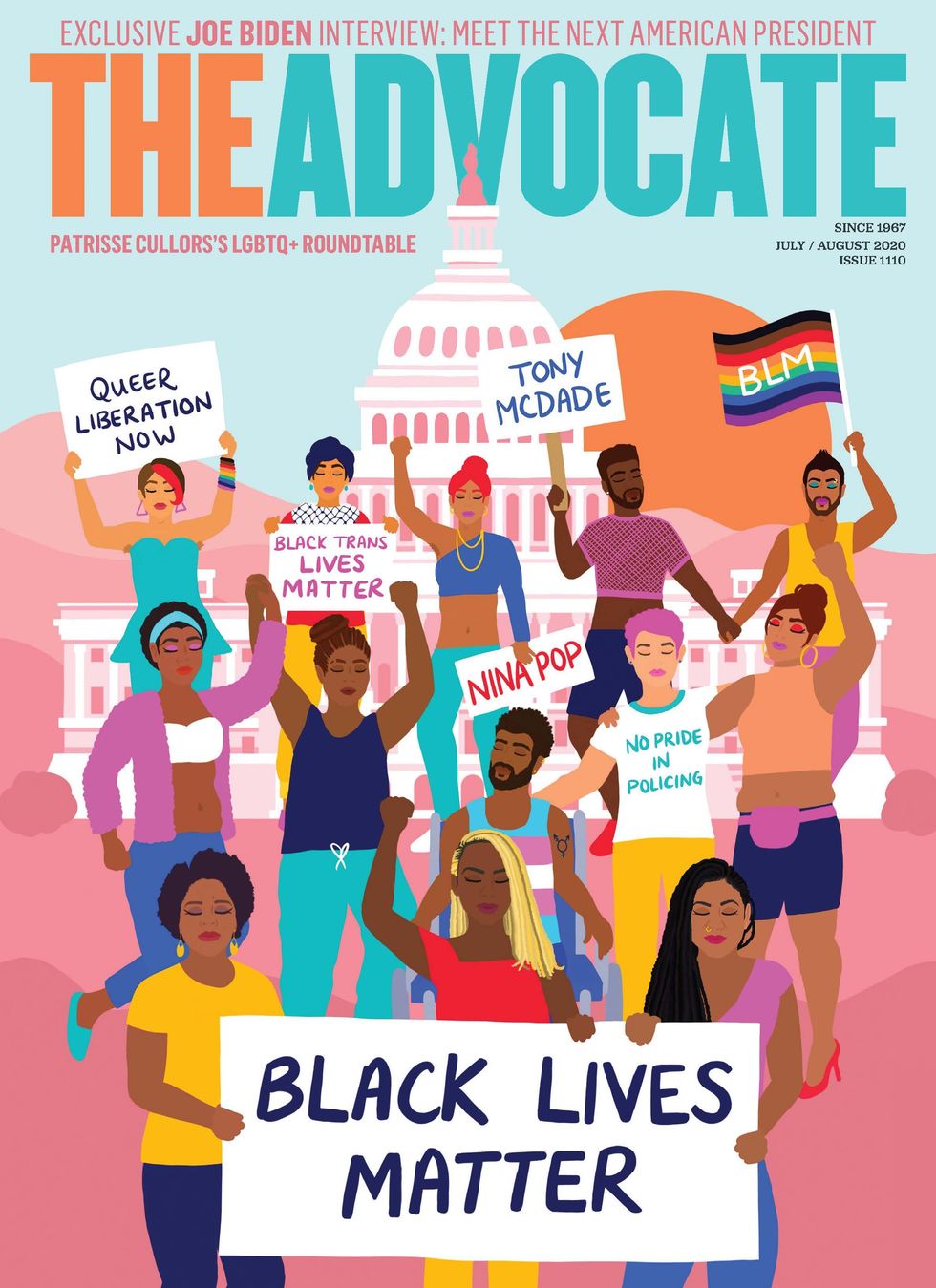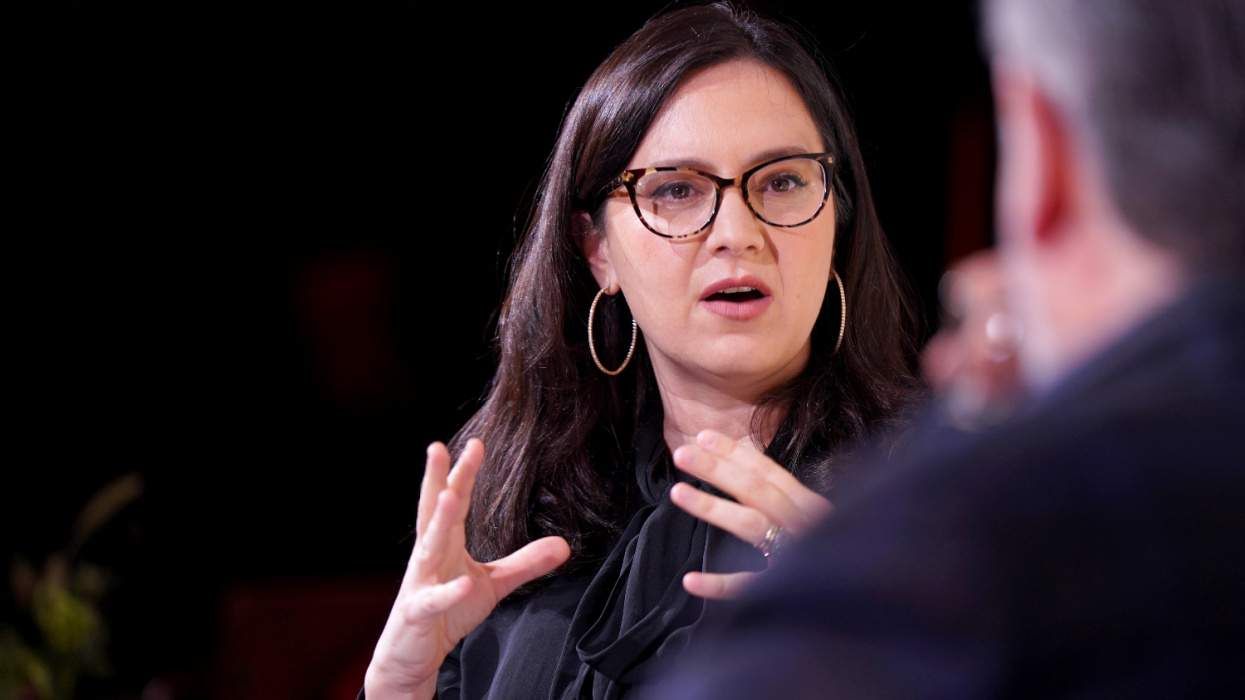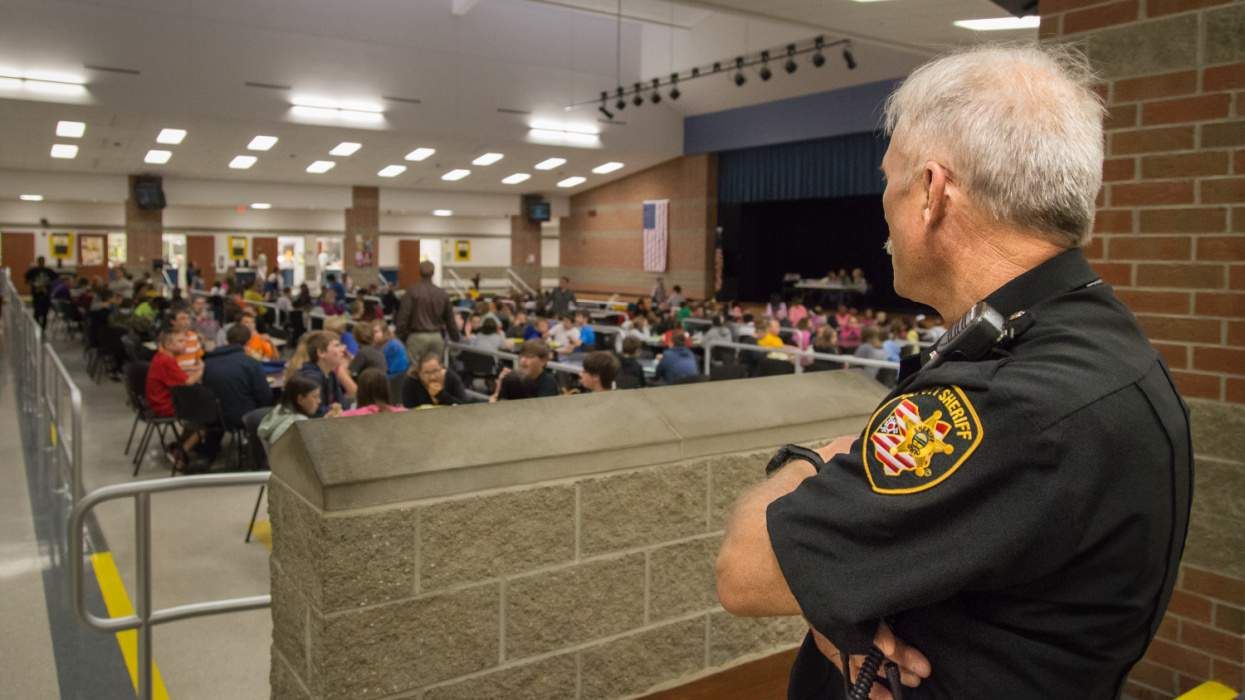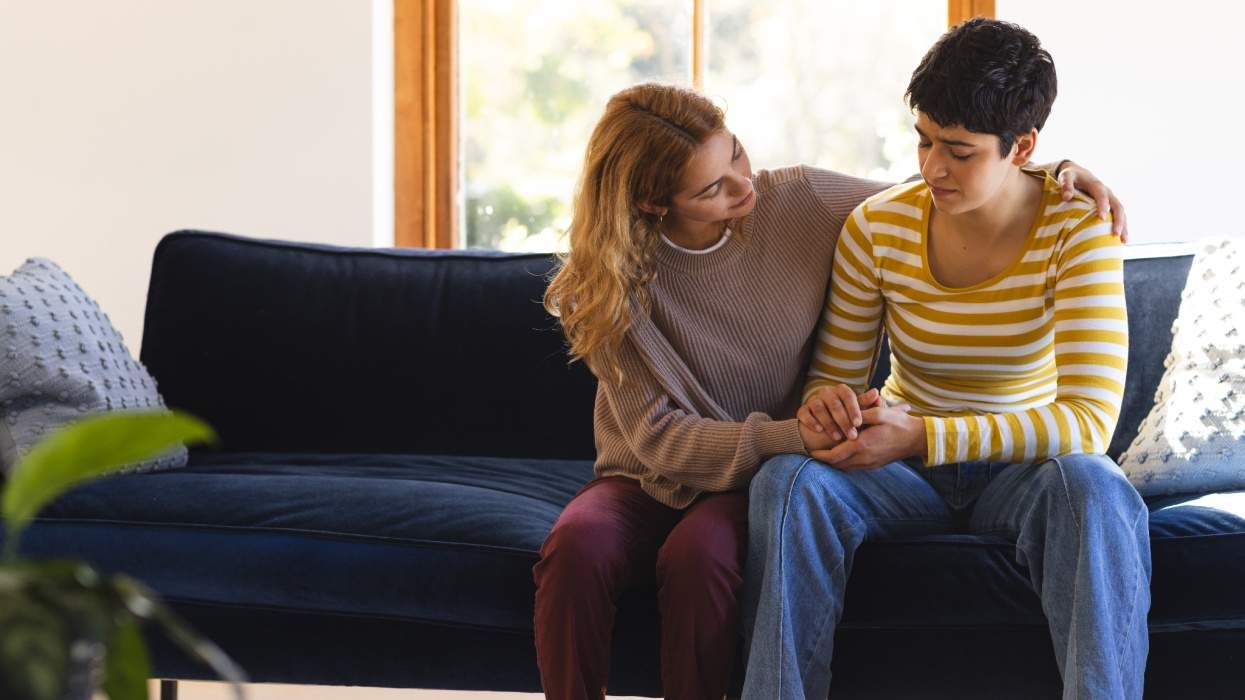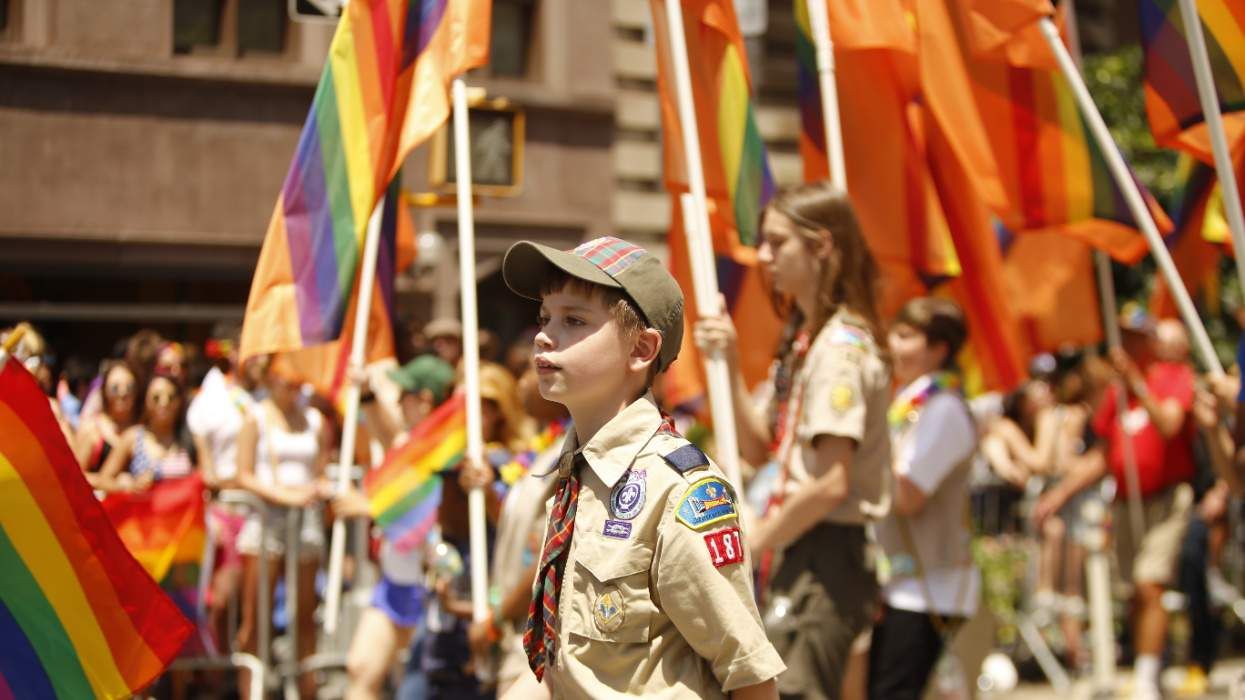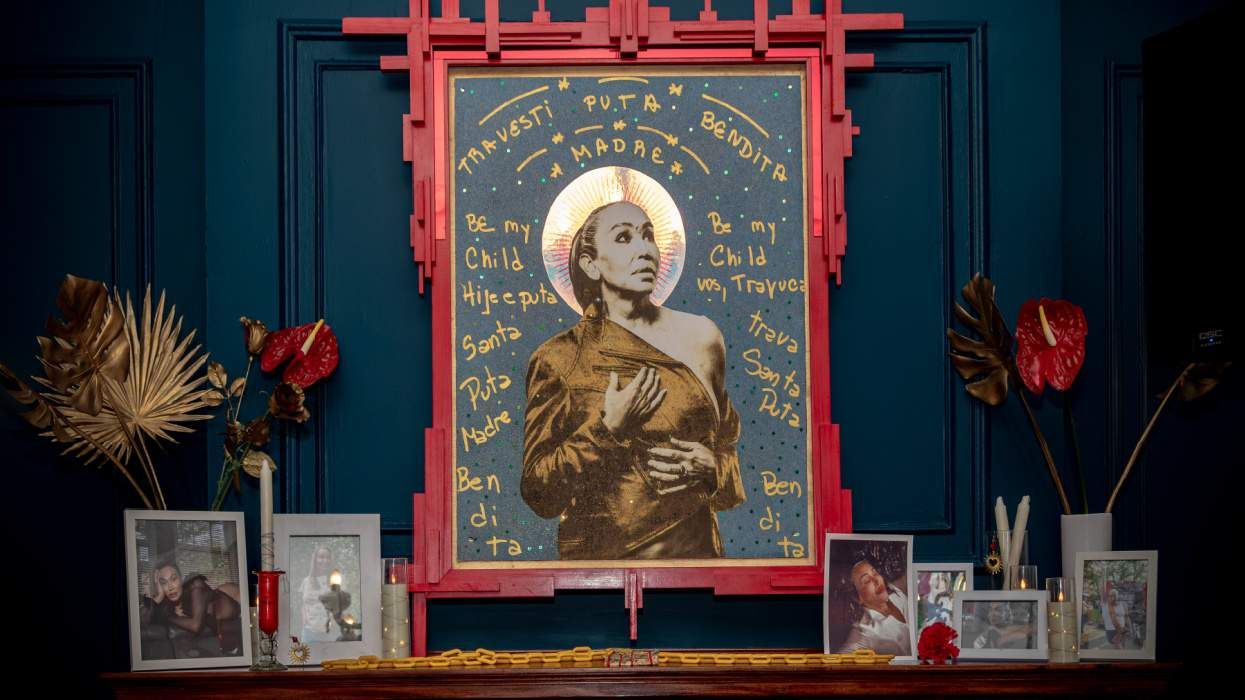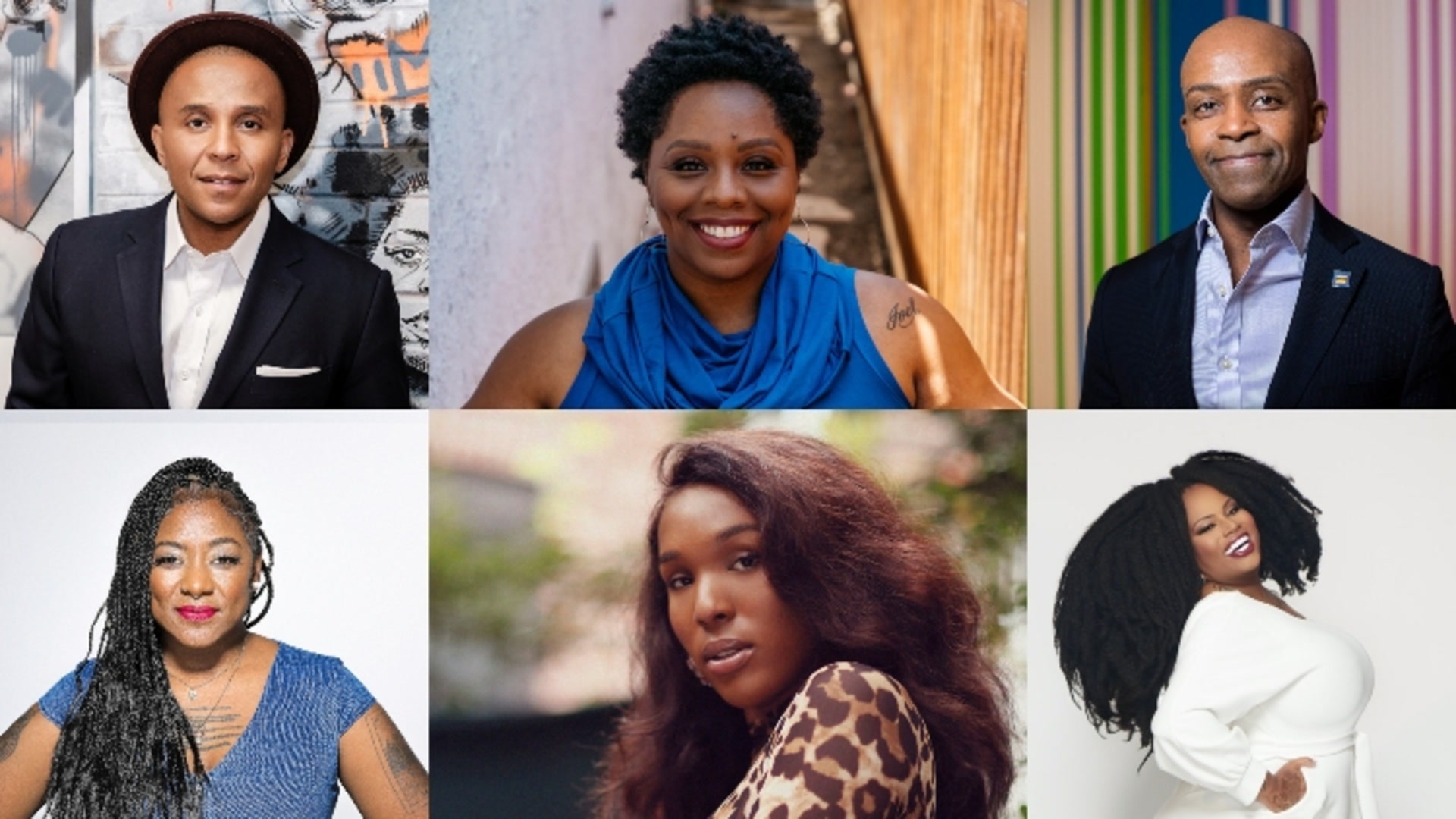
This interview was curated by Patrisse Cullors and printed in the July/August issue of The Advocate magazine, guest edited by Michelle Garcia. Click HERE to subscribe to The Advocate and Out magazines!
When organizer and artist Patrisse Cullors said she wanted to participate in The Advocate's feature on the Black Lives Matter movement, we knew it was a perfect opportunity to bring together some of the most important voices in the Black LGBTQ+ space. Cullors, who cofounded Black Lives Matter with fellow organizers Opal Tometi and Alicia Garza in 2013, has been a force in grassroots organizing, especially in her hometown of Los Angeles.
From leading efforts to reform local jails to building artistic spaces to help her community heal from overpolicing, Cullors has become a driver of change. Even with all of her strategic advocacy work, Cullors has managed to write a memoir, When They Call You a Terrorist: A Black Lives Matter Memoir, and graduate with an MFA at the University of Southern California's Roski School of Art and Design last year.
Here, Cullors curates a lively roundtable discussion with five crucial Black voices in the LGBTQ+ space. Garza, her cocreator, digs into the ways that Black voters are finding the opportunity in this moment to fight for their survival. Alphonso David, the first Black president of the Human Rights Campaign, lays out the ways he's trying to bring more marginalized people into the fold of the biggest LGBTQ+ advocacy organization in the country. Ashlee Marie Preston, whose organization You Are Essential is awarding grants to marginalized essential workers during the global pandemic, talks about how she brings intersectionality to her work.
Rashad Robinson, the head of Color of Change, chronicles the years of work his organization has been leading to get Facebook to dismantle the white supremacist rhetoric that runs rampant on the platform. Aaryn Lang, who has been key to the Black Lives Matter movement and organizing around transgender liberation from her home base in Ohio, will take you to church with her big-picture view on being a Black voter in 2020.
All told, the conversation is one of the most engrossing talks about racial justice and LGBTQ+ identity that you'll catch this year. (See the full video above and read the transcript below.)
Patrisse Cullors: artist, political strategist and co-founder of Black Lives Matter
Patrisse Cullors: I'm so grateful to be in conversation with this team. I handpicked y'all because I love what you all do in the world and how you're thinking about things and the role you play. Can you talk a little bit about the work that you do and why it's important?
Ashlee Marie Preston: I was sitting here thinking, What would I actually classify my work as? Because survival is 24/7. I don't know if anybody ever properly interviewed me or ever fleshed out what the role entailed. It was just being able to not only share my experiences in a way that makes other folks feel seen, more specifically other Black trans folks. But also, it was an opportunity to build space where nobody gave us any. We learned quickly that we have to not be afraid to take up space and that we don't have to shrink any aspect of who we are. Not our Blackness, not our transness, not our fierceness, not my fatness, not my mental health status, none of those things, right? And so I think that it's just been about using media and social movements and personal one-on-one relationships that allow us to heal together, to able to produce work that yields tangible outcomes.
PC: Ashlee, you grew up in the South. How do you feel like the South shaped the work that you do?
Ashlee Marie Preston: activist and media personality
AMP: In the South, Kentucky, Alabama, all those Southern states, you learn very quickly that you ain't got to front for family. So I feel that when I came to the bigger city, people were putting on all these airs, even people who were out there in the struggle with us, even I was telling people that I was turning dates for $20 and then there were girls who were like, "Oh, well, I made $1,500" and I'm like, "This, but that lace front. You can't be making $1,500." What does that healing space look like? Right? So I've actually been able to build community in that way in which I don't make people come find facts from me. You know what I mean? I put it out there. I don't have to front for family.
PC: Well, you once said you're the "woke" Cardi B.
AMP: [Laughter] People, they were calling me the Cardi B of politics.
PC: The Cardi B of politics! I completely agree. That's what I appreciate about you the most is that you're just clear and focused. You make it really clear we don't need to do all of this fronting to do the work that we do. I'm going to kick it over to Rashad.
Rashad Robinson: It's been a day. Facebook is trying to tone me down.
PC: I actually would love for you to talk about the work that you're doing around Facebook. [In July, Color of Change and other civil rights groups organized a Facebook boycott that multimillion-dollar companies have followed, pulling advertising money from the social media site.]
RR: Yeah, at Color of Change we work to hold institutions accountable to create a more human and a more just world for Black people. When Black people win, all people win. And so a lot of what we are doing at Facebook is an extension of that. It's about holding powerful institutions accountable and forcing them to do things that they don't want to do. One of the ways we talk about power at Color of Change is through the founding of the organization in the aftermath of Hurricane Katrina, when no one was nervous about disappointing Black people as we were on our roofs begging for the government to do something and literally left to die.
And so when I think about Facebook, I think about a platform that has 2.6 billion users, that's more followers than Christianity, that has a founder that is chairman and CEO and had 60 percent of the shares. Facebook likes to think of themselves as a public square, but a private person shouldn't own and operate a public square. And so as a result of sort of how Facebook operates the platform day in and day out is weaponized against our communities.
Rashad Robinson: president of Color of Change
As someone who's come of age in [the time of] social media, I can sometimes listen to folks like Mark Zuckerberg wax poetic about how Black Lives Matter started on his platform, which I'm sure kind of incenses you all more than me, but it incenses me to hear this billionaire sort of, I don't know, lecture civil rights leaders about free expression. When we created free expression. We created the ability to be able to express ourselves for a better future inside of a framework that actually has civil rights protections.
Lots of times, white libertarians will talk about human rights without the kind of cultural context of civil rights and the ways in which the First Amendment [works with the] 13th, 14th, and 15th Amendments with the Voting Rights Act and the Civil Rights Act and all these other frameworks that actually make for free expression to actually sing so that we actually are free.
PC: Thank you, Rashad. And thank you for your work. I'm kicking it over to you, Aaryn [Lang]. You and I have known each other for quite some time, and you've been in Facebook jail several times.
Aaryn Lang: Yes.
RR: Sheryl Sandberg told me there's no such thing as Facebook jail, which is crazy, right?
AL: That's a lie.
PC: Exactly!
AL: Whoever told you that was a liar, because I really have been reformed through Facebook's criminal system. [Laughter from the group] I am so aware of the words that I used on that platform and every other platform I'm on, I was like, "Wow, they did a number on me." I was playing my PlayStation and I was afraid that I said something that was going to get me banned from my PlayStation! But kudos to Facebook for really figuring out how to reform the internet criminal in me....
Aaryn Lang: activist, writer, and media personality
What do I do? I echo some of Ashlee's thoughts with what I do. I think I'm just trying to survive. I'm trying to speak to people that would like to live in a world that is capacious enough to hold a fat Black disabled trans woman. And how that looks, it looks a multitude of ways.
It looks like public speaking. It looks like a consultancy that I'm starting because for years I've been invited to all types of organizations that want consulting from Black trans women for pizza parties and $15 gift cards. And I learned that they were getting work out of us that costs thousands of dollars. And I want that money.
My work is the work of a Black trans woman trying to survive... and maybe save up some money so that me and my family can actually know what it means to enjoy the riches of life outside of the margins of life--outside of the marginalization that we faced, outside of the low wages that we're expected to be excited for.
PC: I love you, Aaryn. Alphonso, your work at the Human Rights Campaign, you're the first [Black president]. I was reading up on your work and was thinking a lot about what it means to be the first person in a position that you're in.
Alphonso David: I've been a lot of firsts, and it's not a badge of honor like people think it is. If you're going to be responsible to yourself and be responsible to your legacy, both culturally and emotionally, being first comes with a lot of responsibility. Because more often than not, you're put in a position to effect significant culture change. It means that you have to engage in organizational change. It means that you have to change hearts and minds because you're coming in with a new and a different perspective that in many cases have been under- or devalued. So for me being the first Black person, the first person of color to run the largest LGBTQ+ civil rights organization in the world, is for me more than a phrase and what people say, "Oh, that's a great thing." For me, that means completely deconstructing this thing that we call "quest for equality." This thing that we call the quest for liberation.
Alphonso David: president, Human Rights Campaign
When I talk about the work that we're doing at the Human Rights Campaign, I know that it may result in people leaving the organization as members. It's already happened. But I know it also means that more people will come to the table. Our quest for liberation, our quest for liberation as LGBTQ+ people, has and always will be inclusive of Black people. And we know that we've been undervalued and devalued for such a long time.
People weren't talking about Marsha P. Johnson and Sylvia Rivera until this year. Many people didn't sort of understand why we celebrate a Pride until this year. And so as I do this work and make sure that we're looking through an intersectional lens, I redefine what that means, and I say we're focusing on people who are multiply marginalized. Because if we focus on people who are multiply marginalized, then we can actually achieve equality and it can be sustainable.
PC: Alicia [Garza], I'm coming to you, girl. We've known each other for a very long time. It's now almost a decade and a half. And what I know about Alicia is that Alicia is a nerd, a science-based organizer nerd, and has the best hairstyles, just so everybody knows and realizes. So
make sure you follow her on Instagram. (@ChasingGarza)
AMP: And nails.
PC: All the time! [Garza], can you tell us about the Black Census Project? I didn't realize it and I'm pretty sure so many of us didn't realize that Black folks hadn't been asked what we needed for almost 150 years. Is that correct?
Alicia Garza: Part of the reason that I started the Black Futures Lab and the Black to the Future Action Fund is really to make Black communities powerful in politics.... Black folks have been through so much, not just in the last decade, but ever since we were brought here at the bottoms of boats in chains, and frankly, we deserve better. We deserve the things that all communities deserve. We deserve to be safe. We deserve to live with dignity and we deserve to be powerful.
The way we started this organization was by embarking on a project that we called the Black Census, and the idea behind it was that we wanted to talk to as many Black folks as we possibly could about what it is that we experience every single day in the economy, in our democracy, in our society. And bigger than that, what it is that we want to see done about it. There are lots of polls that happen all the time that talk to a small amount of people, and well, they talk to the same kind of people.
Alicia Garza: activist and co-founder of Black Lives Matter
We partnered on the one hand with powerful online civil rights organizations that had large Black bases, like Color of Change, to get this survey out into the world. But we also did an offline project where we partnered with 28 Black-led organizations in 26 states across the nation.
What that resulted in was a few things. One, we were able to train 100 Black organizers in a year. We didn't just want people to do surveys. Surveys aren't that exciting. We wanted to take that opportunity to actually give people the tools that they needed to be powerful and organizing their skills as part of that toolbox. The other thing that we did was that we focused on organizations, again, that were rooted in communities that don't get included.
Our survey represents the voices of people who have homes and people who don't. Our survey represents the voices of people who are trans, gender-nonconforming, lesbian, gay, bisexual, transgender, and not. Our survey included people who were currently incarcerated and formerly incarcerated. And our survey included people who were born in the U.S. and people who are not. And we did this again because we really wanted to reflect the breadth of who we are as a people here in the U.S., but we also wanted to get the best ideas for how to solve some of the biggest challenges that our communities are facing and how we do that in such a way where it actually reflects the range of experiences that our communities have.
PC: So let's transition our conversation into the elections. Where's your heart? Where's your mind and your brain at around this election?
AD: I am both excited about the opportunity and concerned about apathy. I'm excited about the opportunity because we have within our grasp for the first time that I can remember where people of color, marginalized communities, are using our voices in a way that I just haven't seen before. And if we're able to have those voices manifest themselves in real change, it could change all of our lives. And again, this is for me, not only about the presidency, it's about making sure that young people and all voters understand that, "Yes, I need to vote for the mayor. I need to vote for the city council. Because the mayor actually appoints the police chief, and the city council is responsible for overseeing their budgets." And if we can get that granular and involved in our elections, we can transform the landscape. What I'm concerned about--voter suppression, long lines, no absentee ballots being returned, and people not engaging in the way that they should, or being so concerned about the long lines [and] not engaging in our election process.
From my perspective, our lives are on the line. Our democracy is on the line. What Trump has done for the past three and a half years is strip away some of the fundamental pillars that define our democracy. If he's able to legally use tear gas on peaceful protesters for a photo op, we've lost our democracy.
And when I say we're fighting for our lives, I'm not only talking about LGBTQ+ people. I'm talking about Black people. I'm talking about Latinx people. I'm talking about immigrants. We're all fighting for our lives because what he's doing is strategically stripping away at all of the protections that...some of us have taken for granted and we're losing them. We're challenging him in court, of course. But if he has another pass at this, for another four years, the country that we know will be lost. So I'm both excited about this election but also concerned about apathy.
AG: Personally, I'm feeling like I really want to land a punch and I'm feeling scared, honestly. At least twice during this quarantine, I've gotten phone calls from Elizabeth Warren and I've broken down into tears because I keep saying to myself, "Damn, we could have had a bad bitch." When I see this man out here talking about how coronavirus is a liberal hoax, I'm like, "Let me tell you something. Miss Rona is not here to play no games with you, with me, or anybody else. You could call it a hoax if you want to."
In the meantime, more than [140,000] people have died, and that was completely preventable. We have zero leadership. And the kind of antics that this president is up to is not just dangerous, but it threatened to literally turn this country into something that I think nobody would recognize.
I feel clear about what I need to do in November. I'm not happy about it. I feel clear that I need to get my people to do what we need to do in November. And my people aren't happy about it. And that's just facts. And I'll just be honest. One of the things that has been really hard for me as somebody who does not like politics and does not like politicians but has stepped up in the ways that I think people tend to call us to do, it was just last week, actually, that I had my first conversation with the Biden campaign. Even though we've done all this work, right, to help support whoever the nominee is going to be, it's to better understand what it is that Black communities expect of you and for you to invest in. Right?
Illustration by Shirien Damra
RELATED: Meet Shirien Damra, The Palestinian Illustrator Behind Our New Cover
We just have not seen that level of investment. That is what makes me scared. I think plenty of people know what they got to do, but I think even more people at this stage may stay home, not because they don't care about what's happening, but because they don't think they can impact it. Given the kind of stance, I think, that I've seen up until recently, I don't blame them for feeling that way.
It's been hard to get the person who we know needs to take over in order for us to not go over the cliff to really, deeply take this seriously. I'm very encouraged about some of the recent additions there. I don't want to, at all, knock the hard work that people are doing. I'm just, I'm feeling anxious that we may have another 2016 on our hands with disinformation, misinformation, and also people feeling like I need somebody to connect with me and let me know you understand what I'm going through and you're fighting for me too. So I'm stepping up as per usual. But child, this back is tired of being a bitch.
AMP: It was very heartbreaking for several reasons. One, I had to confront the fact that I never thought a white woman from Oklahoma [Warren] will be the closest thing to Black liberation that I would ever see, and that was very conflicting. I had to have several conversations with sisters and brothers and community. To watch them see what I was talking about, but then to watch white supremacy eat its own. To know that the minute this candidate, Elizabeth Warren, opened their mouth and said Black women and started talking about reproductive rights and started talking about community conditions and started talking about incarceration--started talking about trans folks [and] saying our names before anybody else was doing that. Out of all the candidates I met with, Elizabeth Warren was the only candidate that came and found me.
But the most earth-shattering part of that was watching the way that Black folks tore each other apart, or non-Black POC, which is why I cringe whenever I hear "people of color." I'm Black. There were people who were non-Black POC who were spewing anti-Blackness under the POC umbrella. And so these campaigns were able to shield and hide their anti-Blackness through non-Black POC.
I watched personally as another campaign tried to destroy my entire life. They doxxed me. They released my old address. They released my phone number. I relate to what Alicia was saying about the ways in which they try to harass and terrorize us.
So let me get this straight. Black women, collectively, cisgender and trans--we're good when we're out here being your attack dogs and we're at the gate guarding your interest? But the minute we make decisions that will yield liberation and true dignity and power for us, we get torn apart and everything you were talking about this entire time, all your stump speeches, all your sound bites and talking points and all of that went out the window.
And so I watched the way that Black women were being attacked. I watched the ways in which some of my mentors, people that I have drawn everything from, watching them get dragged through the mud. And what was worse is that our comrades said nothing. Our comrades said nothing. So that was the first swing they took when they started to fragment community. Here we are as Black folks and brown indigenous folks out here, scraping each other down to the bare bones over white politicians instead of figuring out how we're going to show up as a collective voice and make sure that no matter who comes out of this, we're still going to get those demands met....
What I've been telling people, and then I'll end, is that you don't have to be over the moon about Joe Biden to vote for Joe Biden. I am not about to sit up here on the internet and swat flies and tell lies. We know that there were people who were more qualified and were serious about the work, who is not somebody that we're going to have to worry about, like whatever the case, because I'm not going to say all the negatives to discourage people [from voting for Biden].
But what I will say is that we have to take this serious. And it has to be that moment where we make sure that all voices are in the room. So we can't just keep targeting only the communities that have enough money to give, because to be honest, your fiercest warriors are always going to be the ones who have nothing to lose but life itself.
PC: Aaryn, I want to take it to you. How are you feeling about this moment, this election, where we're at in 2020? What are you seeing? What's coming up for you?
AL: I want to be really responsible to this space. And before I say anything, I do want to say that I see electoral politics as a tool. I would never knock that tool as one of many tools in our toolbox. But with that being said, this is not a system I have any belief in. And the question, one of my guiding questions has been for a few years now, is what is the incentive in the United States for Black liberation? And I never exactly come to an answer. So I'm stuck with so many questions during this time. And in 2020, what I really want to see is newness all around. I think what these uprisings have shown the government is that, pardon my French, ni**as are done taking shit.
AL: How does our government respond to ni**as not being afraid to lose anything, like, what you said, Ashlee, but their lives. I feel like I keep saying and laughing, like they saw ni**as burning down the city, and they said, "They're coming to my house. They're coming to the suburbs." So we got companies posting Black Lives Matter. Everybody and they mamas are saying Black Lives Matter because please stay your asses downtown, please. For me, what I really want all of us to sit with in this time of our lord and savior coronavirus is that we're living on a planet that is becoming increasingly hostile towards us.
So even more than the election, I want us to really pay attention to what is happening around us right now. I don't want to be the pessimistic voice. I don't want people to resign to hopelessness. That's not what I'm saying. But I want us to be very clear about what we're witnessing around us right now. Coronavirus is not just something that has appeared out of thin air. We're living on a planet that we have abused and used over and over again. And unfortunately, we're all implicated in that because our government forces us to be. So as much as we want to say, "Well, that's not us. That's them," we all throwing our shit in a landfill. You can throw your shit in a blue bag all you want to, it's going to a landfill, boo.
What are we going to do with the state of our planet? And what are we going to do if this is literally the last moment we have? And that's how I've been looking at that this. So I'm like, yes, please get out and vote for Joe Biden or Kanye West or whoever the hell you need to vote for, go for it, honey, because this might be all we have.
So I love this moment where so many people are rising up and talking their shit. Everybody's like, "I want a piece of this. I'm going to fight back. I'm going to say what I want," because all of us are affected by these things in different ways. And also, I'm terrified too, Alicia, that after we do get Trump out of office, we've been witnessing white supremacy trying to inflict fear in every single one of our hearts in a very new--I think not new for the country, but perhaps new for a lot of us who are living right now--in a very new way. We've got to get Trump out of office. He's not been talking to us for four years. He's been talking to people that will shoot up schools. He's been talking to people who will shoot up churches. He's been talking to people who will run over protesters with their car. So I want us to be very clear about what is happening right now. And we can lean into electoral politics all we want again, yes, because that's a tool. But we need to understand that what we're up against right now is not simply policy.
What we're up against is the same ways that we want to change hearts and minds, their hearts and minds have been changed too. So I've said that I've had to expand who it is I'm talking to. Because I actually don't care if you're Black. I actually don't care if you're white. I don't care if you're trans. And I actually don't give a fuck. What I care about is are you dedicated to restoration? Because all of these things that we talk about, transphobia, anti-Blackness, white supremacy, these are things that destroy. So I'm talking simply to people who are very interested in restoring harmony on this earth and that work, we have to be willing to do whatever is required of us. I need more people to be willing to put more skin in the game right now because people like me, I'm a Black trans bitch from Ohio. I put my life on the line by even being visible and talking about this shit.
PC: That's why I love you, Aaryn. Legit. Legit. I'm going to take it to you, Rashad. How are you feeling about these elections? And then this is our close-out. So before you go, Rashad, I really did ask each of you because you reflect a different part of our communities. And I think we have a tendency to try to bring everybody who thinks alike to talk about a thing. That doesn't get us to where we need to go. And so I did want you to share exactly how you feel, Aaryn, because I know where you stand on this. We've been talking about this for years. So this conversation is a conversation that is of our community, and we should be talking in all the ways right now. And so, Rashad, I want to close with you. Where are you at in this moment around this election?
RR: Well, not an easy lift to follow each of you on here. Especially you, Aaryn. That last piece is not an easy lift. For those of you that know me, and Alicia and Patrisse know me well, I am focused and determined.... We have to put people in office that we can hold accountable. But to think that voting is some pathway to liberation and not a piece of the work we have to do would be a mistake. Right? And so I also think about it in terms of how I like to talk to Black people about voting. Because I think that we get talked about in ways that can oftentimes pathologize Black people in our relationship to voting and participation.
Make no mistake to folks who may not be Black who are watching. And make no mistake to people who are Black. We get sold a story about voting that is not true. Because Black people are the protagonists in the American story of voting. There is no group of people that have fought harder, stood in longer lines, overcome more to actually participate in the project of American democracy, and have done more in the face of so many reasons to not do anything, have consistently showed up. Black women are constantly asked to show up and save Democrats and then get blamed when Democrats don't get saved.
Telling a full story about what it means to vote and also telling a real story about the sort of ways in which representation alone is not everything. That Black faces in high places is not necessarily a pathway to our liberation.
How I'm feeling about this election is focused and determined. Focused on the fact that we do have to change district attorney offices around this country. And there are nearly a thousand district attorney seats up this election cycle, and they are the most powerful actors in the criminal justice space. And Patrisse and I in particular have been doing work around district attorney races around the country to change how district attorneys see their job and change how the public sees the role of DAs. And while that is not liberation, and we shouldn't sell it as that because DAs have far too much power, we should recognize that actually getting someone in office that reduces jail sizes, that changes who gets prosecuted for things, has real-world impacts on people's lives. It has measurable outcomes on how people experience the world.
And we shouldn't undersell that sort of as a pathway to being able to make people's lives better.
When I think about this election, I think about what does it mean to make justice real? And justice is not freedom and justice is not liberation, but justice is actually something that all of us deserve and we all need more of.
Who do I put in office that I can hold accountable? Who do I put in office that I can ensure is nervous about disappointing me? Who can I put in office that can be the vehicle that gets me to the next thing that I need to do? And for Black folks, and for Black queer folks, we should be thinking about this next election as just a continuation of how do we translate our presence, our visibility, our sort of the shout-outs from the stage that we get, the hashtags that we'll use to talk about us. How do we use all of that and translate that presence into power?
PC: That's where you at. Thank you so much, Ashlee Marie Preston, Alphonso David, Rashad Robinson, Alicia Garza, and Aaryn Lang. This was really powerful. This was amazing.

